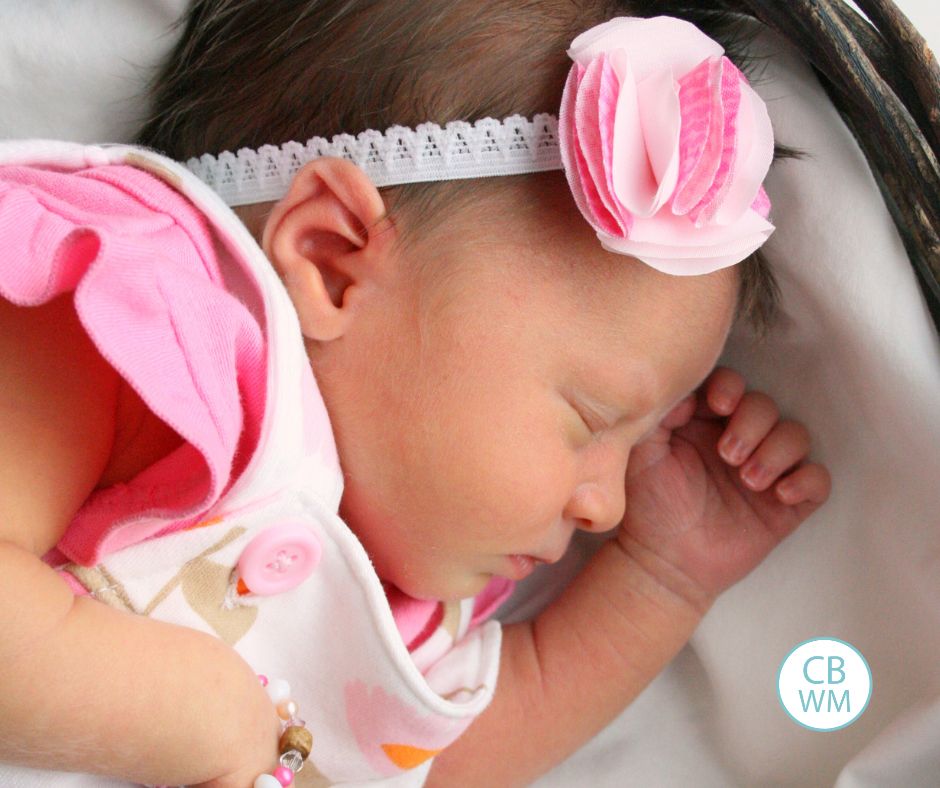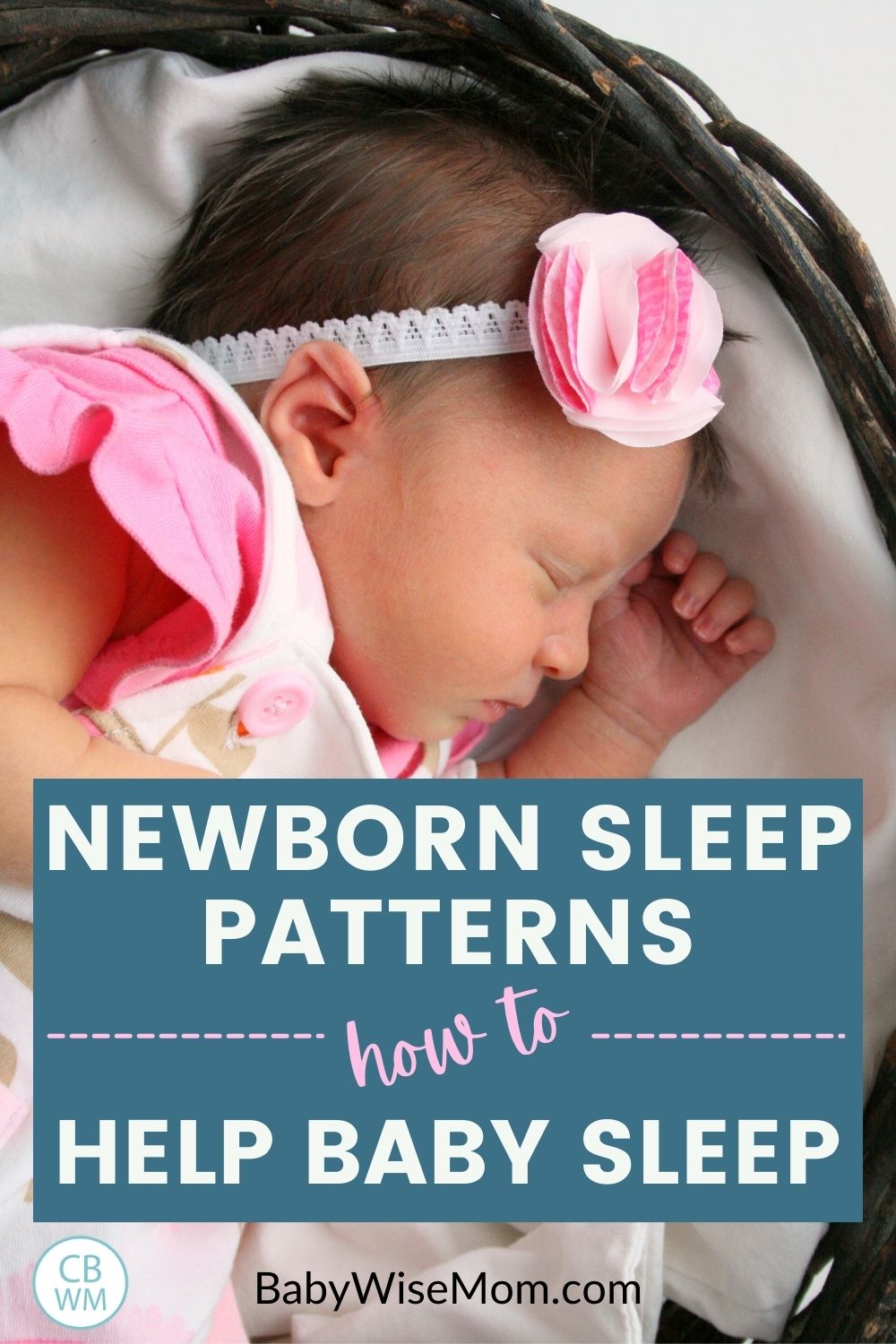Newborn baby sleep is not intuitive to parents. Understand these 5 facts for newborn sleep patterns to help your newborn sleep really well from birth. Learn why babies are so noisy when they sleep, how REM and quiet sleep work for newborns, how body temp affects newborn sleep, newborn melatonin levels, and newborn wake windows.

Despite the fact that we all sleep daily, sleep is not necessarily “intuitive” for us. There are many facets of sleep we don’t understand in ourselves (What time is best for you to go to bed? What time to wake up? How many hours are best for you? Do you sleep better with or without socks? etc.).
If it is hard for us to figure out our own sleep patterns, it stands to reason it will be hard to do with a baby. Figuring out the sleep of your new baby can be quite the project.
Newborns usually have a regular pattern to their sleep, and understanding that can help you understand what is going on and what you can do to help facilitate great newborn sleep.
This post may contain affiliate links which won’t change your price but will share some commission.
Post Contents
1-Newborns Make Noise Often, But That Doesn’t Mean They Are Awake
A brand newborn is usually super noisy when first born. They make all kinds of grunts, sighs, “huh’s”… They couple these noises with eyes fluttering open and often smiles. It is adorable!
It is fun to watch, but do not get baby up every time you hear these sounds. This is just a noisy part of the sleep cycle. Let baby continue to sleep unless it is time for baby to be eating anyway.
2-Sleep Cycles Change Every 45 Minutes
A newborn baby has two types of sleep. A newborn goes into sleep in REM sleep (See Healthy Sleep Habits, Happy Child page 59). So your baby starts a nap or night sleep in REM (rapid eye movement) sleep. This is also known as active sleep and is a light sleep.
Your baby will be noisy during active sleep with lots of body movement.
About 45 minutes into a nap, the baby will transition into non-REM sleep, or quiet sleep. This is a deep sleep. These transitions happen about every 45 minutes.
A the end of the sleep cycle, your baby will be the most likely to wake up due to noises or other factors. This is where a white noise machine can be very helpful to block out distractions.
At the 45 minute mark, your baby will stir. Your baby might make noise and might even open her eyes. Your baby might just shift slightly. Do not mistaken transitioning for waking up. Let your baby move into the next sleep state.
This sleep cycle change is the reason I recommend to wait 10 minutes before getting baby up from a nap or even in the night. You don’t know if your newborn is just being noisy at a sleep transition or actually awake. Even a crying baby can still be asleep.
It is worth noting that active sleep and quiet sleep accomplish different things in the body.
Newborn sleep patterns are different than baby sleep patterns and adult sleep patterns.
Note that when your baby finishes a sleep cycle, your baby will move into quiet alert time when your baby will lay in the crib or bassinet quietly and look around.
This phase will move into the active alert phase when your baby pays a lot more attention to sights and sounds, then into the crying phase when your baby cries and moves erratically.
3-Body Temperature Influences Sleep
Healthy Sleep Habits, Happy Child talks about biological rhythms starting on page 50. One influence on sleep is body temperature, and this remains true even up to adults.
There isn’t a way for you to really measure or respond to this, but know that as a baby gets to about 6 weeks old, baby’s temperatures start to get closer to what is best for longer night time sleep. There are biological factors out of your control that will impact how well baby sleeps at night.
>>>Read: Finding the Ideal Temperature for Your Child’s Sleep
4-Melatonin Impacts Sleep
Melatonin is a hormone that comes from your pineal glad. Melatonin helps control your sleep and wake cycles. A newborn is born with “high levels of circulating melatonin” that came from the mother while in the womb. That is present for the first week. This is when you should sleep as much as you can as the mom.
After a week, all of that melatonin wears off and the baby is left with…not much. Around 6 weeks old, “melatonin begins to reappear as the baby’s pineal gland matures” (page 51). The levels are “extremely low” until 12-16 weeks old (around 3-4 months old).
You can see from those numbers that they coincide with ages that babies start to sleep better. 6 weeks, followed by about 12…sound familiar?
And do not decide to give your baby melatonin to induce more sleep. It has not been tested on babies. Also, I have to think there is a reason babies were designed the way they were designed by someone smarter than we are, so don’t medicate or supplement your baby against what every healthy newborn baby naturally does–decrease melatonin levels.
One way to help with melatonin to be at its ideal for your baby is to understand circadian rhythm and how sunlight affects that. Read Circadian Rhythm Explained and How It Impacts Sleep for more.

5-Newborns Do Not Stay Awake Long
Your newborn will be up for a very short time before needing to nap again. Your newborn will be awake anywhere from 30-60 minutes, including feeding time, before it is time to sleep once again (see my post Optimal Waketime Lengths to figure out how long your baby should be awake).
Do not fight your baby on this. Let your baby sleep and your baby will sleep better overall. Overly tired babies start to sleep very poorly.
Understanding wake time length (aka wake windows) is vital for setting up a baby schedule.
>>>Read: How Long Should a Newborn Be Awake Between Naps
It can be hard to accept your baby’s short wake window in the daytime. You want more time with your baby!
If you want more time with your baby, you can absolutely hold your baby sometimes. It is wise to be aware of the amount of time since baby fell asleep. Do not try to put baby down in her own bed right around the 45 minute mark. This will likely wake her up since she is transitioning.
Put her down before or after the transition if you are going to. If you hold your baby through the transition, do not try to wake the baby up during the transition. Let baby get into the next sleep cycle.
So What?
You might be reading all of these facts and wondering, so what? Not everyone has the head space for internalizing the facts of newborn sleep. Here are your takeaways:
- Newborns are noisy sleepers. Do not get your newborn up early from a nap or at night when your newborn is just being a newborn. Be sure your baby really is awake before getting her up.
- Newborns change sleep cycles about every 45 minutes. The first 45 will be noisy and active sleep. Then it will move into a calm sleep. You want both sleep cycles in a nap, which is why you want a nap to be at least 1.5 hours long.
- Your newborn will have individual temperature needs for sleep. Figure out if your newborn likes socks or not and how to dress your newborn for sleep.
- Melatonin affects sleep. There isn’t a lot you can do about natural levels, but there are some things you can do like exposure to the sun. Have patience through these natural levels your baby goes through.
- Newborns need a really short wake window. If you try to force your newborn to stay awake longer, you will cause sleep problems.
Conclusion
I hope this information helps you understand the sleep of newborns a bit better. You want to set up good sleep habits for baby sleep schedule.
Helpful Related Posts:
- Fix Your Baby’s Day/Night Confusion
- Dressing Baby for Sleeping
- Healthy Baby Sleep Elements and Developments
- My Sleep Hierarchy For Newborns
- Keeping a Newborn Awake During Feedings

This post first appeared on this site in February 2015
